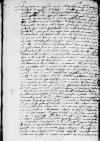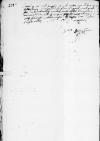Letter #1708
Ioannes DANTISCUS to Tiedemann GIESELöbau (Lubawa), 1537-09-1[3]
English register: Dantiscus informs Giese about the return of the royal chamberlain (Marcin Wolski) with good news (on the election of the Warmia bishop). He encloses the letters he has received for Giese’s perusal. The arrival of royal envoy Mikołaj Nipszyc in Lubawa is expected within four days. Next, Nipszyc and the royal chamberlain will go to Frombork for the designated election day. Dantiscus assures Giese that he can discuss everything safely with Nipszyc. He also encourages Giese to have Nipszyc stay at his house to facilitate contacts. Dantiscus has found out from the royal chamberlain all about the doings of his and Giese’s enemies at the royal court, but thinks they are not dangerous, since matters have been concluded successfully. In accordance with Giese’s suggestion, Dantiscus will not go to Frombork for the election, so he appoints Giese his plenipotentiary during the election and asks him to write a letter of attorney and send him a copy, and to excuse his absence to the Warmia Chapter. After the election, he invites Giese to Lubawa, for consultations on dealing with the formalities in Rome. Dantiscus is surprised at Alexander (Sculteti)’s endeavors (to secure the coadjutorship of Heinrich Snellenberg’s canonry in Warmia for Sculteti’s nephew Alexander von Suchten). Until the election, Giese should keep up Sculteti’s hopes, and in the meantime try to accomplish something with Snellenberg, because he fears that Sculteti’s new ideas about the assignation of Warmia canonries will anger the queen. Giese will find the details in the enclosed letter from Sculteti to Dantiscus. Dantiscus is greatly worried by the news of unrest and rebellion near Lvov – he fears the annulment of the war campaign could embolden the enemies. He thinks Giese’s gratitude for his goodwill is unnecessary. He thanks him for the fish.
Manuscript sources:
Auxiliary sources:
Prints:
| ||||||||||||||||
Text & apparatus & commentary Plain text Text & commentary Text & apparatus Excerpts concerning Dantiscus' travels
Eximio et Venerabili Domino
Eximie et Venerabilis Domine, Frater et Amice carissime et honoran(de) or honoran(dissime)⌈honoran(de)honoran(de) or honoran(dissime)⌉. Salutem et omnem felicitatem
Accepi 1537-09-11⌊pridie1537-09-11⌋ Dominationis Vestrae cf.
De cf.
De rebus nostris ad
Plura igitur in praesens non scribo. De
Quae
 BCz, 244, p. 228
Ceterum, quod Dominatio Vestra scripsit se mihi nescio quae debere, quod ea, quae paper damaged⌈[uae]uae paper damaged⌉ debeo, facio, necessarium non fuit. Si quid, quod gratum est, feci, nihil aliud quam mutuae mihi debet benevolentiae remunerationem Dominatio Vestra. Cui pro piscibus magnam gratiam habeo paper damaged⌈[o]o paper damaged⌉, eamque felicissime valere cupio.
BCz, 244, p. 228
Ceterum, quod Dominatio Vestra scripsit se mihi nescio quae debere, quod ea, quae paper damaged⌈[uae]uae paper damaged⌉ debeo, facio, necessarium non fuit. Si quid, quod gratum est, feci, nihil aliud quam mutuae mihi debet benevolentiae remunerationem Dominatio Vestra. Cui pro piscibus magnam gratiam habeo paper damaged⌈[o]o paper damaged⌉, eamque felicissime valere cupio.
Ex


